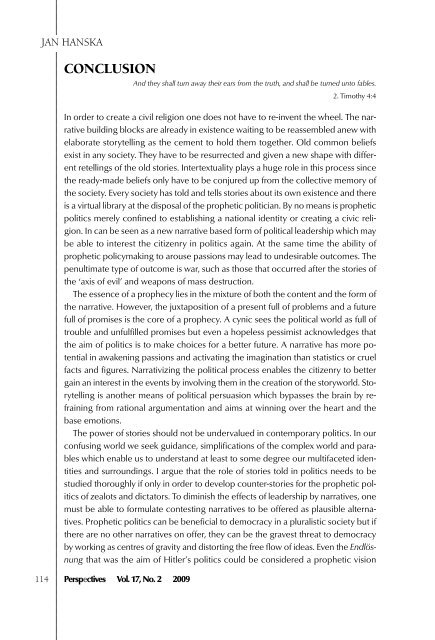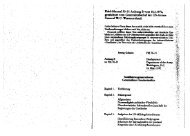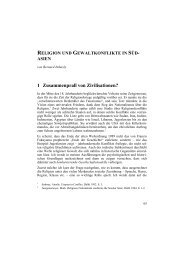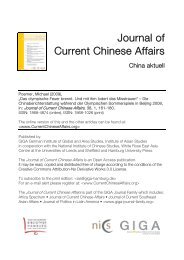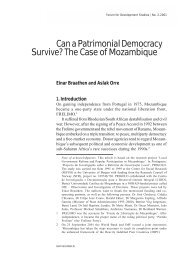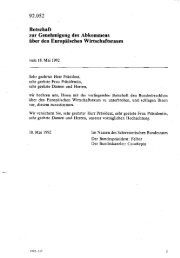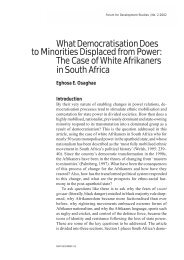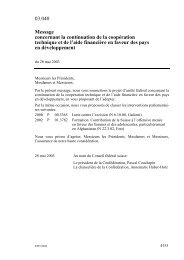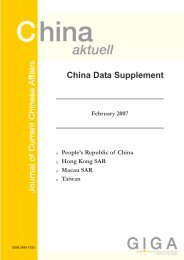Prophetic Politics
Prophetic Politics
Prophetic Politics
You also want an ePaper? Increase the reach of your titles
YUMPU automatically turns print PDFs into web optimized ePapers that Google loves.
JAN HANSKA<br />
CONCLUSION<br />
114 Perspectives Vol. 17, No. 2 2009<br />
And they shall turn away their ears from the truth, and shall be turned unto fables.<br />
2. Timothy 4:4<br />
In order to create a civil religion one does not have to re-invent the wheel. The narrative<br />
building blocks are already in existence waiting to be reassembled anew with<br />
elaborate storytelling as the cement to hold them together. Old common beliefs<br />
exist in any society. They have to be resurrected and given a new shape with different<br />
retellings of the old stories. Intertextuality plays a huge role in this process since<br />
the ready-made beliefs only have to be conjured up from the collective memory of<br />
the society. Every society has told and tells stories about its own existence and there<br />
is a virtual library at the disposal of the prophetic politician. By no means is prophetic<br />
politics merely confined to establishing a national identity or creating a civic religion.<br />
In can be seen as a new narrative based form of political leadership which may<br />
be able to interest the citizenry in politics again. At the same time the ability of<br />
prophetic policymaking to arouse passions may lead to undesirable outcomes. The<br />
penultimate type of outcome is war, such as those that occurred after the stories of<br />
the ‘axis of evil’ and weapons of mass destruction.<br />
The essence of a prophecy lies in the mixture of both the content and the form of<br />
the narrative. However, the juxtaposition of a present full of problems and a future<br />
full of promises is the core of a prophecy. A cynic sees the political world as full of<br />
trouble and unfulfilled promises but even a hopeless pessimist acknowledges that<br />
the aim of politics is to make choices for a better future. A narrative has more potential<br />
in awakening passions and activating the imagination than statistics or cruel<br />
facts and figures. Narrativizing the political process enables the citizenry to better<br />
gain an interest in the events by involving them in the creation of the storyworld. Storytelling<br />
is another means of political persuasion which bypasses the brain by refraining<br />
from rational argumentation and aims at winning over the heart and the<br />
base emotions.<br />
The power of stories should not be undervalued in contemporary politics. In our<br />
confusing world we seek guidance, simplifications of the complex world and parables<br />
which enable us to understand at least to some degree our multifaceted identities<br />
and surroundings. I argue that the role of stories told in politics needs to be<br />
studied thoroughly if only in order to develop counter-stories for the prophetic politics<br />
of zealots and dictators. To diminish the effects of leadership by narratives, one<br />
must be able to formulate contesting narratives to be offered as plausible alternatives.<br />
<strong>Prophetic</strong> politics can be beneficial to democracy in a pluralistic society but if<br />
there are no other narratives on offer, they can be the gravest threat to democracy<br />
by working as centres of gravity and distorting the free flow of ideas. Even the Endlösnung<br />
that was the aim of Hitler’s politics could be considered a prophetic vision


